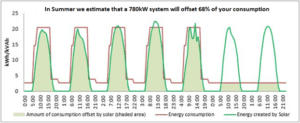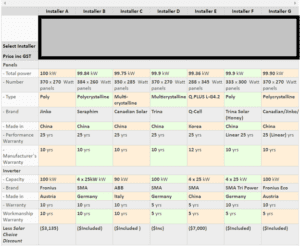Over the past decade the attractiveness of solar as a means to reduce operating costs and lower carbon emissions has increased dramatically in line with improvements and price-reductions in technology. However these are some of the major factors that differentiate Solar Power’s ability to make a meaningful impact.
- Energy consumption matching daylight
Given solar batteries at their current pricing generally push the payback period for projects from 2-3 years to 10+ years, businesses that have the majority of their consumption during the hours that solar panels can generate energy have the greatest feasibility. It is widely expected in the industry that battery prices will continue to fall and the ‘economic tipping point’ is expected to be reached in 2020.
- Roof structure and material
Solar installers have developed expertise with a variety of roof shapes and materials, however there are a couple of distinguishing factors that will inevitably drive up the cost to install solar.
- Multiple storey buildings requiring a scissor lift or a crane (expect $500 to $750 a day for these machines)
- If the meter room is a significant distance from the optimal roof spot for the PV array (expect $3 to $15 per metre beyond 20m)
- Concrete and tiled roofs instantly require addition installation effort
- Roofs that are unable to support 15kg per sq. metre require structural improvements or specialty lightweight panels
- Getting the best deal on your job
Getting a good quote is the easiest way to optimize your ROI. Ensuring you have a balance between good pricing and high quality products and worksmanship will ensure you optimise the outcome over the lifetime of the project. With hundreds of Solar Installers around Australia with varying levels of experience we regularly see quotes come in 100% above market rates and often see quotes that a below cost – neither of which are a smart option. At Solar Choice we make it easy for you to get a large number of competitive quotes to ensure you are getting a well priced deal from a reputable installer.
- Roof slope and azimuth
If you are lucky then your building will have an unobstructed north facing roof with a gentle 27.5 degree slope (for Brisbane). If not then you will face a decision of whether to add additional panels to reach your required PV output or to use tilt frames to achieve the optimal angle. Tilt frames on average add 10% to the projects cost.
- Existing electricity rates
While normally we see that the Solar ROI is attractive even where energy consultants have been used to broker bulk rates, residents and businesses who can achieve the greatest return on investment are currently paying high rates to their electricity retailer.
- Solar Panel Costs: Solar Choice Price Index | April 2025 - 1 April, 2025
- Solar Panels For Homes – All You Need to Know About Solar Systems - 18 March, 2025
- Best NSW Solar Feed-In Tariffs - 17 March, 2025

